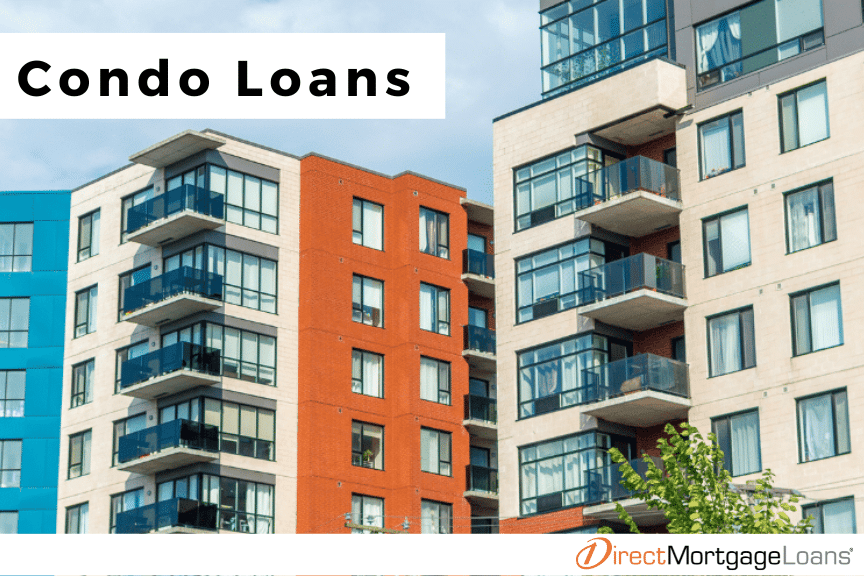Condo Loan
When it comes to condo loans, we understand that each borrower has specific needs. Whether you’re a first-time buyer or an experienced homeowner, our extensive range of loan programs, including FHA loans, conventional loans, VA loans, and USDA loans, ensures that we have the perfect solution for you.
Condo loans help home buyers finance the purchase of condominiums as primary residences, vacation homes, or investment homes. Warrantable condos (condominiums that meet certain minimum guidelines outlined by Freddie Mac and Fannie Mae) can be financed and underwritten as a traditional mortgage.
Our knowledgeable loan officers will help you navigate the complex condo loan requirements, ensuring a smooth and hassle-free experience from start to finish.
With our comprehensive understanding of Fannie Mae and Freddie Mac guidelines, we can assist you in financing a condo purchase in a warrantable condo project. Looking to finance a condo that doesn’t meet the traditional requirements? No problem! We also offer creative financing options for non-warrantable condos.
At Direct Mortgage Loans, we strive to make purchasing a condo as stress-free as possible, providing you with competitive mortgage rates and flexible payment options tailored to your needs.
What is a condo?
Condominiums, or condos for short, are residential buildings where each unit is individually owned instead of being owned by a landlord or property management firm. Condo owners solely own the interior of their specific unit, while the external and shared areas of the building are usually managed by a condo or homeowners association (HOA).
Condo vs House
If you are deciding between buying a house or a condo, there are some key factors to consider. First, think about your budget. Condos are usually less expensive than houses, which makes them a good option for first-time homebuyers or those looking to downsize. However, you will also need to pay for things like homeowner’s association (HOA) fees, which cover maintenance and amenities.
When deciding between a condo or a house, consider how much space you need. Condos are usually smaller than houses and are ideal for individuals or small families who value convenience over spaciousness. However, if you need a lot of space or value your privacy, a house may be a better choice for you.
Your lifestyle is also important to consider. Condos often come with shared amenities like pools and gyms, which can make for a more social living experience. If you prefer low-maintenance living and shared amenities, a condo might be the way to go. But if you want to customize your space and value independence, a house might be better.
It is important to understand the ownership structure of each option. If you buy a house, you will own both the house and the land it sits on, giving you full control. If you buy a condo, you’ll only own the inside of your unit and share common areas with other owners. Keep in mind that condos offer a maintenance-free lifestyle, but you will have to follow HOA rules and pay fees.
The decision of whether to buy a condo or a house depends on your personal needs and preferences. Think about your budget, space requirements, lifestyle, and ownership structure before making a choice.
What is a Condo Loan?
A condo loan, also known as a condominium mortgage, is a type of loan that is specifically designed for purchasing a condominium unit.
Here are some situations where getting a condo loan might be appropriate:
- You want to purchase a condo: If you want to buy a condominium unit, then a condo loan is the appropriate type of loan to get. Unlike other types of mortgages, condo loans take into account the unique features of a condo unit, such as homeowner association (HOA) fees and special assessments.
- You want to live in an urban area: Condos are often located in urban areas, making them a good option for those who want to live in the heart of a city. If you want to live in an urban area and prefer the convenience of condo living, then a condo loan may be a good option for you.
- You want to downsize: Condos are generally smaller than single-family homes, making them a good option for those who want to downsize. If you’re looking to downsize and want to live in a space that requires less maintenance, a condo loan may be a good fit for you.
- You want to avoid yard work and maintenance: Condos are typically managed by an HOA, which takes care of yard work and maintenance for the entire complex. If you don’t want the responsibility of yard work and maintenance, then a condo loan might be a good option for you.
It’s important to note that when you apply for a condo loan, the lender will review the condo complex’s financial health and other factors to ensure that it meets the lender’s standards regarding condo purchase financing, including condo loan rates, mortgage payments required, and more. This is to protect the lender and ensure that the loan is a safe investment.
It’s important to work with a qualified mortgage professional who can help you navigate the unique features of a condo loan and guide you through the application process.
Don’t let the complexities of condo mortgages deter you from achieving your dream of owning a condo. Contact us today, and let our experienced team at Direct Mortgage Loans guide you through the process of securing a condo mortgage loan.
Whether you’re buying a condo as your primary residence or as an investment property, we’re here to help you make informed decisions and turn your condo dreams into reality. Trust Direct Mortgage Loans for all your condo financing needs!
How To Buy A Condo
While the process may vary depending on the loan program and lender, here are some general steps you can take to buy a condo:
Find a Realtor
Locate a trusted Realtor who is familiar with the area and has experience assisting clients in buying and selling condominiums.
Get Pre Approved
Before starting your search for a new condo, obtain pre-approval. Consult with one of our loan officers to determine your monthly mortgage payment and the price range you should consider.
Start Searching
Once pre-approved, begin searching for a new condo.
Make an Offer
Once you’ve found a condo you desire, make an offer. Collaborate with your Realtor to establish your price and negotiate the contract.
Condo Inspection
Schedule a condo inspection promptly to ensure everything proceeds smoothly.
Appraisal
Your lender will order an appraisal to verify that the property’s value aligns with the price you are prepared to pay.
Closing
Closing day marks the last step in the process. Simply bring your documentation, sign the papers, and receive the keys to your new condo.
Different Types Of Condo Loan Programs
There are several different types of Condo Loan Programs Direct Mortgage Loans has available. The most common include Conventional, FHA, VA, and USDA Condo Loans. While the requirements could vary depending on the lender and loan, here are some general guidelines:
Conventional Condo Loan
These types of loans are not directly guaranteed by the government. Rather, they must adhere to the guidelines established by Fannie Mae or Freddie Mac. You may choose a 15-year or a 30-year repayment term. However, these loans usually have stricter credit requirements than government-backed loans like FHA loans.
FHA Condo Loan
An FHA Condo Loan is backed by the Federal Housing Administration, which means it is government-backed. These loans tend to have more lenient requirements than conventional loans and are intended to help low- to moderate-income families receive financing.
VA Condo Loan
This loan is backed by the Department of Veterans Affairs and requires no down payment or the need to pay private mortgage insurance (PMI) for eligible military personnel, veterans, or surviving spouses.
USDA Condo Loan
The USDA provides government-insured loans to low- and moderate-income borrowers in rural areas. These loans have flexible guidelines and require no down payment for purchasing within a designated rural area.
Warrantable Condo vs Non Warrantable Condo
Whether a condo is warrantable or non warrantable determines the type of loan that can be obtained for financing.
Warrantable Condos
A warrantable condo is a type of condominium that has received approval from Fannie Mae and Freddie Mac. Lenders consider warrantable condos to be less risky, which may make it easier for you to secure a loan. To be classified as warrantable, a condo must meet certain requirements.
- Ownership restrictions: Limits on single entity ownership.
- Owner-occupancy requirement: Minimum percentage of units for owner-occupancy.
- Delinquent association dues: Cap on units with overdue dues.
- Lawsuit-free HOA: No lawsuits involving the homeowner’s association.
- Commercial space limitation: Maximum proportion of commercial space.
Non Warrantable Condos
A non warrantable condo is a type of property not backed by the government and is therefore riskier. These properties are often used for short-term rentals or operate similarly to hotels. Here are a few examples of when a condo could be considered non warrantable:
- High Ownership Concentration: When a single person or entity owns over 10% of the units, it can affect stability and financing.
- Commercial Utilization: If more than 25% of the community’s space is used for commercial purposes like retail or dining, it’s considered non warrantable.
- Legal Challenges: Litigation within the condo community could lead to non warrantable status, posing financial risks and operational disruptions.
- Delinquency Risks: High delinquency rates in paying association dues, such as for golf club memberships, indicate financial instability and contribute to non warrantable status.
Securing financing for non warrantable condos may require seeking assistance from alternative sources beyond traditional lenders or conventional mortgages. If you’re considering a non warrantable condo, Direct Mortgage Loans can provide guidance on your available options
Pros and Cons of Condos
If you are considering a condo purchase, it is important to weigh the pros and cons to determine if it is the right choice for you.
Pro of Buying a Condo
- Low Maintenance: One of the primary benefits of condo living is the minimal upkeep required. Owners are relieved of the burden of maintaining exterior property or grounds, allowing them to focus their time and energy elsewhere.
- Affordability: Condos often come with a more accessible price tag compared to single-family homes, making them an attractive choice for budget-conscious buyers.
- Amenities: Residents typically gain access to a variety of building amenities such as gyms, pools, and community spaces, enhancing their overall quality of life without additional costs.
- Shared Expenses: Certain building expenses, like repairs and maintenance, are divided among residents, reducing individual financial burdens.
- Convenience: Condo living is especially convenient for frequent travelers, as the property can be left unoccupied with less worry about security and maintenance.
Cons of Buying a Condo
- Higher Fees: Condo owners are subject to monthly fees, homeowners’ association (HOA) dues, and occasional special assessments, which can add up over time and impact affordability.
- Proximity and Privacy: Living in close quarters with neighbors means less privacy and potentially higher noise levels, which may not suit everyone’s lifestyle preferences.
- Rules and Restrictions: Condos often have more stringent rules and regulations governing occupants and guests, limiting personal freedoms compared to standalone homes.
- Resale Challenges: Selling a condo can be more challenging than a single-family home, as market demand and resale values may fluctuate more significantly.
- Limited Space: Condos typically offer less living space than single-family residences, which can feel restrictive for some buyers, especially those with growing families or specific space requirements.
Should I buy a condo?
If you’re considering a condo purchase, there are several key factors to ponder before determining if this option aligns with your needs. Here are some situations to help gauge whether buying a condo is the right choice for you:
- Urban Living: Condos are commonly found in urban areas, making them ideal for those seeking a city lifestyle. If you prefer the convenience of condo living in an urban setting, a condo loan could be a suitable option for you.
- Downsizing: Condos typically offer smaller living spaces compared to single-family homes, making them a great choice for downsizing. If you desire a low-maintenance living space while downsizing, a condo loan might be the right fit for your needs.
- Avoiding Yard Work and Maintenance: Condos are managed by HOAs, which are responsible for yard work and maintenance tasks. If you wish to avoid the responsibility of maintaining a property, a condo loan can be a suitable option for you.
- Travel Frequently: If you travel often, a condo may be ideal. Living close to neighbors means your home will likely be watched over when you’re away.
FAQ’s About Buying a Condo
Are condos a good investment?
If you are planning to invest in a condo, it is important to consider the current market trends. If the market is expected to grow, investing in a condo might be a profitable investment. However, if the market is expected to decline, it may not be a wise investment.
Condos located in desirable areas with amenities like pools, gyms, and parks tend to have higher value. It is important to invest in a well-maintained condo in a good building for better returns. Keep in mind that HOA fees can vary widely, and some communities have strict rules regarding pets, noise, and renovations. Before investing, make sure you can afford the HOA fees and that you are comfortable with the community’s restrictions.
Is it harder to get a loan for a condo?
Typically, lenders consider condo loans riskier due to the complexities and restrictions associated with shared building spaces. Condo loan applicants may face higher costs for private mortgage insurance, home appraisals, and down payments.
What is the lowest down payment for a condo?
The lowest down payment for a condo varies depending on the loan program and lender you choose. For instance, Direct Mortgage Loans offers 100% FHA Financing with no down payment for eligible borrowers. This program covers the financing of single-family homes, whether detached or attached, duplexes, manufactured homes, planned unit developments (PUDs), townhouses, and condominiums. Find out if you are eligible by reaching out to one of our Loan Officers today!
How long does it take to buy a condo?
Don’t let the complexities of condo mortgages deter you from achieving your dream of owning a condo. Contact us today and let our experienced team at Direct Mortgage Loans guide you through the process of securing a condo mortgage loan.
Whether you’re buying a condo as your primary residence or as an investment property, we’re here to help you make informed decisions and turn your condo dreams into reality. Trust Direct Mortgage Loans for all your condo financing needs!



